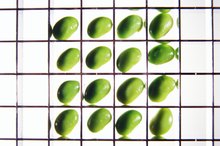What does fact checked mean?
At Healthfully, we strive to deliver objective content that is accurate and up-to-date. Our team periodically reviews articles in order to ensure content quality. The sources cited below consist of evidence from peer-reviewed journals, prominent medical organizations, academic associations, and government data.
The information contained on this site is for informational purposes only, and should not be used as a substitute for the advice of a professional health care provider. Please check with the appropriate physician regarding health questions and concerns. Although we strive to deliver accurate and up-to-date information, no guarantee to that effect is made.
Soy Milk and Birth Control
Soy milk, a beverage derived from the soybean, is well-known for its nutritional profile and purported medicinal properties. According to the University of Maryland Medical Center, soy milk can reduce the risk of some forms of heart disease and cancer, and it may help improve health after menopause 12. Soy milk contains compounds similar to the human reproductive hormone estrogen, which is a key component of most birth control pills. However, soy milk is not known to alter the safety or efficacy of contraceptives.
Birth Control Function
Birth control pills, or oral contraceptives, generally contain a combination of estrogen and progesterone, two hormones involved in regulating the female reproductive system. The synthetic hormones in birth control pills prevent the body from ovulating, or releasing a viable egg. Contraceptives also make the womb less hospitable to sperm and newly fertilized eggs. In theory, any product containing estrogen, or estrogenic compounds, could augment the efficacy and side effects of hormone-based birth control products.
- Birth control pills, or oral contraceptives, generally contain a combination of estrogen and progesterone, two hormones involved in regulating the female reproductive system.
- In theory, any product containing estrogen, or estrogenic compounds, could augment the efficacy and side effects of hormone-based birth control products.
Hormonal Effects of Soy Milk
Is it Possible to Take Vitex With Birth Control?
Learn More
Soy beans contain trace amounts of estrogen-like compounds known as isoflavones. These compounds are not true hormones, but do appear to alter hormone levels when consumed in excessive quantities. The Sloan-Kettering Cancer Center acknowledges that soy isoflavones may influence estrogen levels, leading to increases in bone density and fewer symptoms of menopause 1. MayoClinic.com notes that dosages of between 10 and 106 grams of soy protein per day have been studied for their medicinal effects; these doses provide approximately between 30 and 100 milligrams of isoflavones each day.
- Soy beans contain trace amounts of estrogen-like compounds known as isoflavones.
- These compounds are not true hormones, but do appear to alter hormone levels when consumed in excessive quantities.
Potential Interaction
Because large quantities of soy milk can influence the same hormones involved in contraception, soy milk could theoretically influence the safety, efficacy and potential side effects associated with birth control. Sloan-Kettering notes that excessive consumption of soy milk can cause hormone-related side effects, such as abnormal uterine bleeding, which are also seen among women taking birth control pills 1. Scientists have not specifically investigated the rate of side effects or unplanned pregnancy among women using contraceptives in conjunction with soy milk.
Considerations
Soy and Hormonal Imbalance
Learn More
Despite theoretical concerns regarding the combination of contraceptives and soy milk, there is no specific evidence suggesting that normal dietary quantities of soy milk can interact negatively with birth control pills. MayoClinic.com does not advise birth control users to avoid soy milk. The University of Maryland advises that soy may adversely interact with the cancer drug tamoxifen and the osteoporosis treatment raloxifene 2.
Related Articles
References
- Sloan-Kettering Cancer Center: Soy
- University of Maryland Medical Center: Soy
- MedlinePlus. Estrogen and progestin (oral contraceptives). Updated September 15, 2015.
- National Cancer Institute. Oral contraceptives and cancer risk. Updated February 22, 2018.
- Centers for Disease Control and Prevention. What are the risk factors for breast cancer? Updated September 11, 2018.
- Harvard Health Publishing. New guidelines aim to help women prevent stroke. Updated March 14, 2014.
- Planned Parenthood. How safe is the birth control pill?
- Centers for Disease Control and Prevention. Know the risks, signs & symptoms of blood clots. Updated February 7, 2020.
Writer Bio
Juniper Russo, an eclectic autodidact, has been writing professionally since 2008. Her work has appeared in several online and print-based publications, including Animal Wellness. Russo regularly publishes health-related content and advocates an evidence-based, naturopathic approach to health care.








